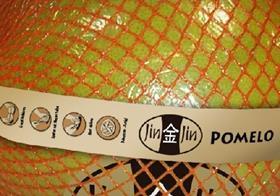
Univeg DFM, the German division of fresh produce group Univeg, has reached agreement with Dutch importer Jin-Jin Europe and Chinese food testing specialist Sino Analytica to work on improving the quality and sustainability of Honey pomelo exports from the Pinghe region of China.
Open to all members of the fresh produce industry, the initiative has also received the backing of the Pinghe government.
Pomelos have enjoyed tremendous growth in popularity both in mainland China and in Europe over the last few years, growth which has lead to rapid growth in production of the fruit in the region and a huge increase in export volumes to Europe.
However, in order to comply with the strict legal requirements for residues of the European market, and the demanding quality and residue requirements of individual major European retailers, improvements in agricultural processes, quality management and QC processes are urgently required.
'A lack of action in these areas will significantly damage the prospects for pomelos from Pinghe on the European market,' the companies said in a joint statement. 'This situation calls not only for education for pomelo farmers and a tight control of growers’ practices during the season, but also systematic residue testing at source in order to prove compliance with European legal requirements and the standards of individual retailers.'
Univeg DFM and Jin-Jin said they shared a common vision to improve the quality and safety of fruit from China and, as a result, had initiated high-level discussions with the Government of Pinghe.
As a result, the Government of Pinghe has established a local food safety centre, funded and managed by Sino Analytica, which already has facilities to perform residue analysis in food in Qingdao and Ningbo and is recognised as one of the Asian country's leaders in pesticide analysis.
Univeg DFM and Jin-Jin, which have also collaborated on the design of new rapid turnaround testing procedures, will be the first importers to use the services of the new food safety centre during the new season, making it an integral part of their grower management systems.
The concept focuses on using a small screen of non-compliant pesticides, based on data gathered over the past three years, to provide exporters with an early warning system, before fruit is committed from the farms and shipped.
Both companies have also agreed a joint modus operandi covering the selection, sampling and traceability of pomelos from field through to point-of-sale and are apparently working on further initiatives to reduce pesticide usage.
'The new sampling and residue testing procedures which we have implemented with Sino Analytica will provide hard reliable evidence that Pinghe pomelos are complying with legal and retailer requirements before our containers are loaded for Europe,' the joint statement added.
The initiative represents a major step in strengthening the long-term credibility of pomelos from the region of Pinghe and boosting the reputation of the region as a supplier of top-quality fruit both for the European market and the even bigger local market in China.
The project partners and the Pinghe authorities said they hoped that other stakeholders would support the drive to satisfy increasing demand for more consistent and sustainable production practices and send a powerful coherent message to growers and packers in the region.



